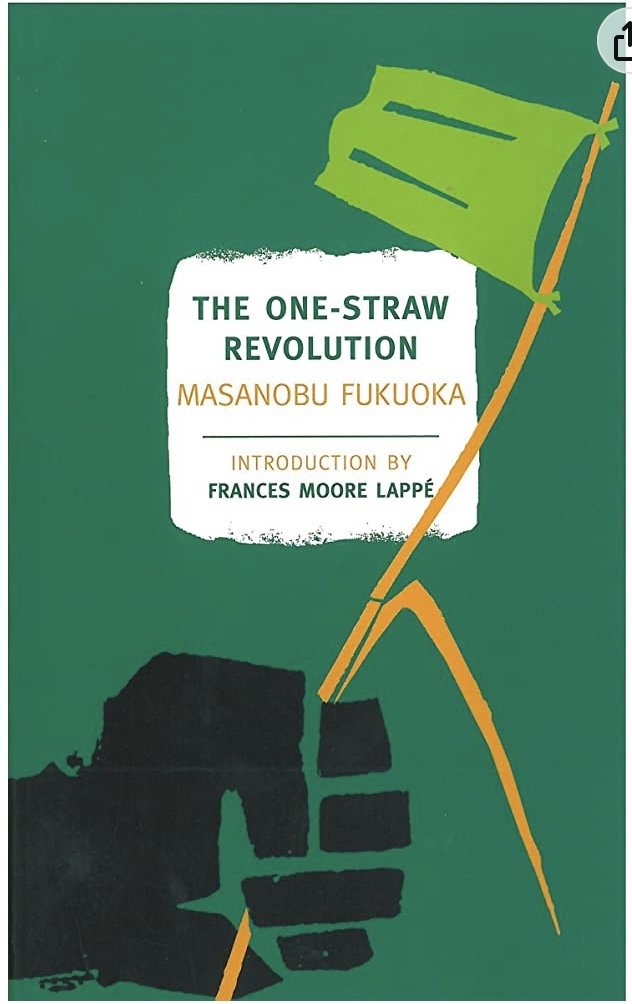 Image 1 of 1
Image 1 of 1


The One-Straw Revolution: An Introduction to Natural Farming
By Masanobu Fukuoka
Paperback, new
Product Description
Call it “Zen and the Art of Farming” or a “Little Green Book,” Masanobu Fukuoka’s manifesto about farming, eating, and the limits of human knowledge presents a radical challenge to the global systems we rely on for our food. At the same time, it is a spiritual memoir of a man whose innovative system of cultivating the earth reflects a deep faith in the wholeness and balance of the natural world. As Wendell Berry writes in his preface, the book “is valuable to us because it is at once practical and philosophical. It is an inspiring, necessary book about agriculture because it is not just about agriculture.”
Trained as a scientist, Fukuoka rejected both modern agribusiness and centuries of agricultural practice, deciding instead that the best forms of cultivation mirror nature’s own laws. Over the next three decades he perfected his so-called “do-nothing” technique: commonsense, sustainable practices that all but eliminate the use of pesticides, fertilizer, tillage, and perhaps most significantly, wasteful effort.
Whether you’re a guerrilla gardener or a kitchen gardener, dedicated to slow food or simply looking to live a healthier life, you will find something here—you may even be moved to start a revolution of your own.
About the Author
Masanobu Fukuoka (1913–2008) was born and raised on the Japanese island of Shikoku. He was the oldest son of a rice farmer who was also the local mayor. Fukuoka studied plant pathology and worked for number of years as a produce inspector in the customs office in Yokohama. But in 1938 he returned to his village home determined to put his ideas about natural farming into practice. During World War II, he worked for the Japanese government as a researcher on food production, managing to avoid military service until the final few months of the war. After the war, he returned to Shikoku to devote himself wholeheartedly to farming. And in 1975, distressed by the effects of Japan’s post-war modernization, Fukuoka wrote The One-Straw Revolution. In his later years, Fukuoka was involved with several projects to reduce desertification throughout the world. He remained an active farmer until well into his eighties, and continued to give lectures until only a few years before his death at the age of ninety-five. Fukuoka is also the author of The Natural Way of Farming and The Road Back to Nature. In 1988 he received the Magsaysay Award for Public Service.
By Masanobu Fukuoka
Paperback, new
Product Description
Call it “Zen and the Art of Farming” or a “Little Green Book,” Masanobu Fukuoka’s manifesto about farming, eating, and the limits of human knowledge presents a radical challenge to the global systems we rely on for our food. At the same time, it is a spiritual memoir of a man whose innovative system of cultivating the earth reflects a deep faith in the wholeness and balance of the natural world. As Wendell Berry writes in his preface, the book “is valuable to us because it is at once practical and philosophical. It is an inspiring, necessary book about agriculture because it is not just about agriculture.”
Trained as a scientist, Fukuoka rejected both modern agribusiness and centuries of agricultural practice, deciding instead that the best forms of cultivation mirror nature’s own laws. Over the next three decades he perfected his so-called “do-nothing” technique: commonsense, sustainable practices that all but eliminate the use of pesticides, fertilizer, tillage, and perhaps most significantly, wasteful effort.
Whether you’re a guerrilla gardener or a kitchen gardener, dedicated to slow food or simply looking to live a healthier life, you will find something here—you may even be moved to start a revolution of your own.
About the Author
Masanobu Fukuoka (1913–2008) was born and raised on the Japanese island of Shikoku. He was the oldest son of a rice farmer who was also the local mayor. Fukuoka studied plant pathology and worked for number of years as a produce inspector in the customs office in Yokohama. But in 1938 he returned to his village home determined to put his ideas about natural farming into practice. During World War II, he worked for the Japanese government as a researcher on food production, managing to avoid military service until the final few months of the war. After the war, he returned to Shikoku to devote himself wholeheartedly to farming. And in 1975, distressed by the effects of Japan’s post-war modernization, Fukuoka wrote The One-Straw Revolution. In his later years, Fukuoka was involved with several projects to reduce desertification throughout the world. He remained an active farmer until well into his eighties, and continued to give lectures until only a few years before his death at the age of ninety-five. Fukuoka is also the author of The Natural Way of Farming and The Road Back to Nature. In 1988 he received the Magsaysay Award for Public Service.
